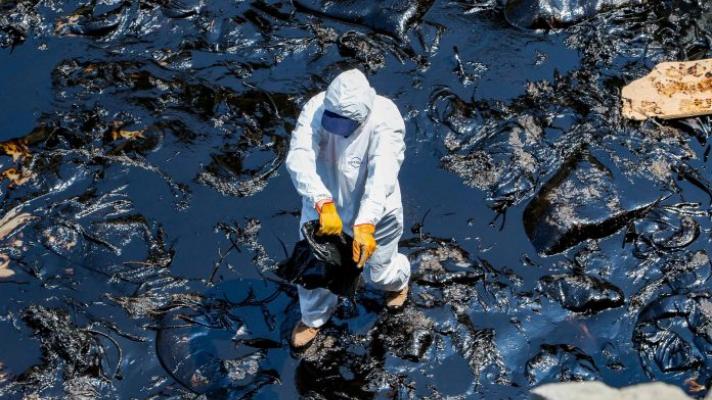
The environmental disaster has paralyzed fishing and tourist activity (Photo: EFE).

Orinoco Tribune – News and opinion pieces about Venezuela and beyond
From Venezuela and made by Venezuelan Chavistas

The environmental disaster has paralyzed fishing and tourist activity (Photo: EFE).
The multinational oil company Repsol, based in Madrid, has failed to answer for the damage it caused on the coast of Peru after a spill of approximately 6,000 barrels of crude oil has significantly harmed the ecosystem of the area.
The spill occurred on January 15 and, according to the company, was caused by the violence of waves resulting from an underwater volcanic eruption in Tonga. The day after the catastrophe, the company said that the incident was quickly overcome. However, the damage was too obvious, and a few days later photos and videos showing the ecological disaster went viral.
RELATED CONTENT: Dutch Court Orders Shell to Pay Nigerian Farmers Over Oil Spills
El daño ecológico causado por la empresa @Repsol en la playa de Ventanilla visto desde el satélite.
El colegio de geógrafos del Perú comparte el trabajo realizado por los geógrafos César Abad Pérez y Mario Polar Pérez a partir de la Imagen Sentinel 2 RGB 283 de fecha 18/01/22. pic.twitter.com/9etT2aCBST
— UDEAL (@udealima) January 23, 2022
The oil leak contaminated 21 beaches in Lima and Callao, as well as two protected areas. Media outlets have confirmed that the environmental disaster paralyzed the activities of more than 3,000 workers in the fishing and tourism industries.
The captain of an Italian ship, which was unloading oil at a refinery operated by Repsol, launched a protest against the Spanish company for making nine mistakes after the spill in mid-January.
RELATED CONTENT: Morrocoy National Park 100% Recovered After Oil Spill Two Months Ago
For its part, the Peruvian government is evaluating the imposition of a fine of 18 million soles, equivalent to $4.6 million USD, for non-compliance with a series of demands imposed to clean up the oil spill. The Agency for Environmental Assessment and Enforcement (OEFA) declared this Wednesday, January 26, that one of those first tasks consisted of the identification of the affected areas, the containment, and recovery of the spilled oil.
A second spill then occurred, exacerbating the situation.
It is not the first time that a transnational oil company commits environmental crimes. Companies that exploit natural resources in other countries and increase their capital must assume their responsibilities when they damage the ecosystems. Repsol also has a history of social irresponsibility, fraud, tax evasion, and misappropriation of subsidies.
Featured image: The environmental disaster has paralyzed fishing and tourist activity (Photo:EFE).
Translation: Orinoco Tribune
OT/JRE/SL